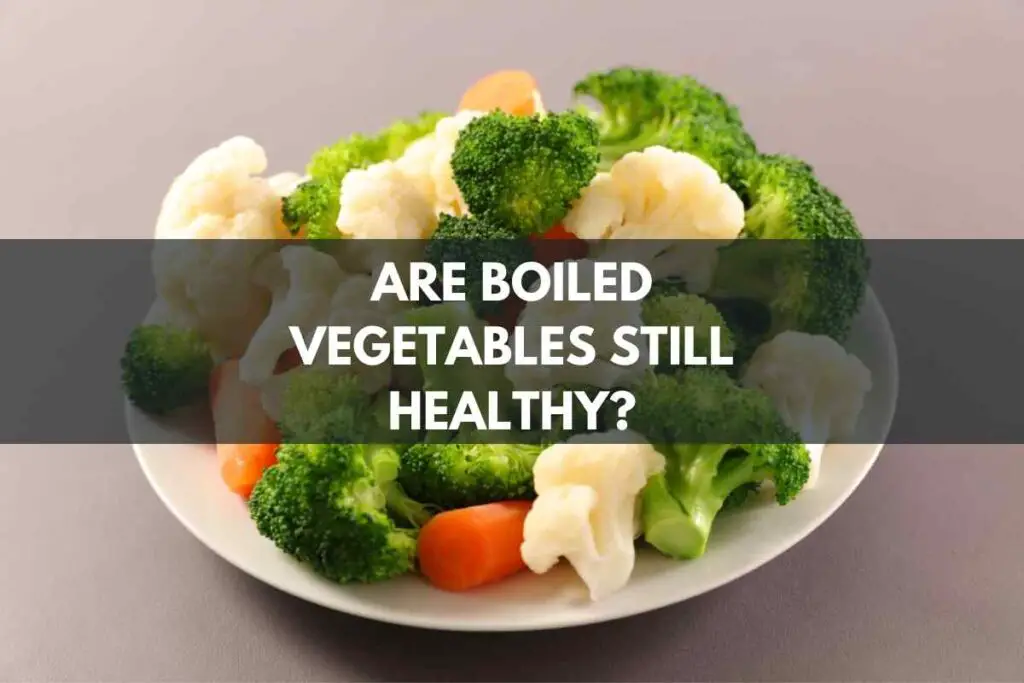Boiling vegetables helps to preserve their nutrients, making them a healthy choice for people who are looking to improve their overall health.
Boiled vegetables are still healthy because they are cooked in water, which means that they retain more of their nutrients than other methods of cooking. Additionally, boiling is a gentle cooking method that doesn’t require the use of oil or fat, which can make vegetables less healthy.
Are Boiled Vegetables Still Healthy? We all know that vegetables are good for us. They’re packed with nutrients and fiber that are essential for our health.
Boiling vegetables does not reduce their nutritional value. In fact, boiling can actually make some vegetables more nutritious.
For example, boiling increases the antioxidant content of tomatoes and carrots. However, there are a few things to keep in mind when boiling vegetables. First, be sure not to overcook them.

Overcooked vegetables can lose some of their nutrients and become mushy. Second, don’t add too much salt or other seasonings.
Too much salt can make boiled vegetables taste bland and can also increase your sodium intake. If you’re looking for a healthy and delicious way to prepare vegetables, try boiling them.
Contents
- What vegetables lose nutrients when boiled?
- What vegetables should not be boiled?
- Which is better raw or boiled vegetables?
- What is the healthiest way to cook vegetables?
- Does boiling destroy nutrients?
- Are Boiled Vegetables Still Healthy?
- How Healthy Are Boiled Vegetables?
- What Are The Health Benefits Of Boiled Vegetables?
- Are Boiled Vegetables As Healthy As Raw Vegetables?
- Tips
- Conclusion
What vegetables lose nutrients when boiled?
What vegetables should not be boiled?
Which is better raw or boiled vegetables?
What is the healthiest way to cook vegetables?
Does boiling destroy nutrients?
Boiled vegetables are a great addition to any meal and can help you reach your daily recommended intake of vegetables.
Are Boiled Vegetables Still Healthy?
Are boiled vegetables still healthy? The answer may surprise you – yes, boiled vegetables are still healthy! While they may not have the same nutrient density as raw or lightly cooked veggies, they still offer plenty of health benefits.
Boiled veggies are a great way to get your daily dose of vitamins and minerals, and they’re also a low-calorie option if you’re watching your weight. Plus, they’re easy to prepare and can be a tasty addition to any meal.
So, go ahead and enjoy boiled veggies as part of a healthy diet. Just be sure to not overcook them, as this can cause them to lose some of their nutritional value.
How Healthy Are Boiled Vegetables?
There are many benefits to boiling vegetables. Boiling vegetables helps to retain their nutrients and makes them more digestible.
Additionally, boiling vegetables helps to kill any harmful bacteria that may be present. Boiled vegetables are a healthy option for people of all ages.
They are a good source of vitamins and minerals, and they can help to promote a healthy digestive system.
Boiled vegetables are also low in calories and fat, and they are a good way to get your daily recommended intake of vegetables.
What Are The Health Benefits Of Boiled Vegetables?
There are many health benefits to boiling vegetables. Boiling vegetables helps to retain their nutrients and makes them easier to digest.
Boiled vegetables are also a good source of fiber and can help to regulate blood sugar levels.
Additionally, boiling vegetables can help to reduce the risk of some chronic diseases such as heart disease and cancer.
Are Boiled Vegetables As Healthy As Raw Vegetables?
There are pros and cons to both boiling and raw vegetables. Boiling vegetables can make them more easily digestible and can also help to release some of their nutrients. However, boiling can also cause vegetables to lose some of their vitamins and minerals.
Raw vegetables are less likely to lose their nutrients, but they may be more difficult for your body to digest. Ultimately, the best way to eat vegetables is the way that works best for you.
If you enjoy boiled vegetables, then go ahead and enjoy them. If you find that you digest raw vegetables better, then stick to eating them raw.
Tips
- Boiled veggies are easy to digest.
- They are packed with nutrients.
- Boiled veggies are low in calories.
- They can help you lose weight.
Conclusion
In conclusion, boiled vegetables are still healthy. They are a good source of vitamins and minerals, and they are low in calories. However, they may not be as nutritious as other methods of cooking vegetables.
